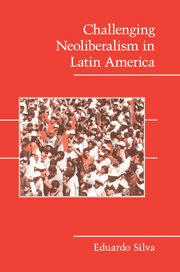Book contents
- Frontmatter
- Contents
- List of Tables
- Preface and Acknowledgments
- List of Acronyms
- 1 THE INCONVENIENT FACT OF ANTI-NEOLIBERAL MASS MOBILIZATION
- 2 CONTENTIOUS POLITICS, CONTEMPORARY MARKET SOCIETY, AND POWER
- 3 THE ARGUMENT: EXPLAINING EPISODES OF ANTI-NEOLIBERAL CONTENTION IN LATIN AMERICA
- 4 ARGENTINA
- 5 BOLIVIA
- 6 ECUADOR
- 7 VENEZUELA
- 8 PERU AND CHILE
- 9 CONCLUSION
- References
- Index
7 - VENEZUELA
Published online by Cambridge University Press: 05 June 2012
- Frontmatter
- Contents
- List of Tables
- Preface and Acknowledgments
- List of Acronyms
- 1 THE INCONVENIENT FACT OF ANTI-NEOLIBERAL MASS MOBILIZATION
- 2 CONTENTIOUS POLITICS, CONTEMPORARY MARKET SOCIETY, AND POWER
- 3 THE ARGUMENT: EXPLAINING EPISODES OF ANTI-NEOLIBERAL CONTENTION IN LATIN AMERICA
- 4 ARGENTINA
- 5 BOLIVIA
- 6 ECUADOR
- 7 VENEZUELA
- 8 PERU AND CHILE
- 9 CONCLUSION
- References
- Index
Summary
Venezuela's episode of anti-neoliberal contention, which spanned two distinct waves, began in February 1989 during the second presidency of Carlos Andrés Pérez and ended with the election of Hugo Chávez in December 1998. However, the characteristics of contentious politics in this case were different. In the previous cases, persistent political and economic exclusion in the construction of contemporary market society created new popular sector organizations – or radicalized existing ones – that patiently strengthened associational power and built collective power by coordinating mobilization and protest with other emerging or existing organizations. In Venezuela, unlike Bolivia and Ecuador, the principal labor confederation never sustained leadership or coordination of mass anti-neoliberal mobilization, although it called several general strikes at crucial moments. Neither did factions of the established labor movement break away to develop a strategy of contentious and electoral politics based on the organization and coordination of excluded popular sector groups as occurred in Argentina.
Instead, nearly constant anti-neoliberal contention involved highly decentralized and uncoordinated groups. Anti-neoliberal protests, strikes, marches, demonstrations, and violent disturbances of varying magnitudes (some affecting much or all of the country) occurred almost daily. Most were sharp, short-lived actions. Participants included state employees, public sector industrial unions, transport workers, community associations and activists, students, teachers, professors, and doctors; thus spanning popular sector and middle-class social groups. Their demands usually involved satisfaction of immediate material interests threatened by free-market economic reforms, which the state mollified with real or promised concessions, frequently of small magnitude.
- Type
- Chapter
- Information
- Challenging Neoliberalism in Latin America , pp. 195 - 229Publisher: Cambridge University PressPrint publication year: 2009
- 1
- Cited by



